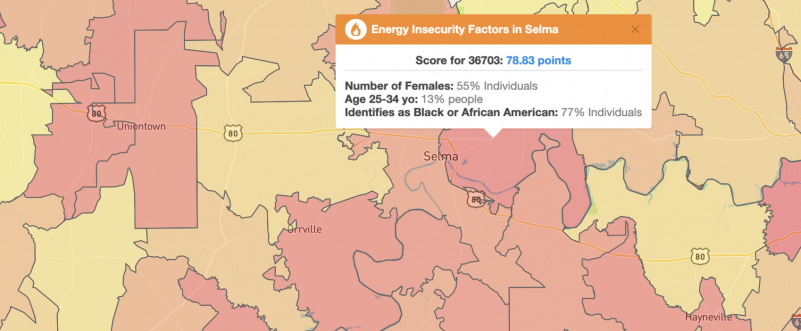Alabama: Birthplace of Rosa Parks, the Tuskegee Airmen, and the world’s first electric streetcar! It also happens to be a state where a lot of people struggle to pay their utility bills each month. Check out this very special edition of BlastPoint’s Map of the Month.
Alabama… The place to go if you want to visit the Legacy Memorial, Freedom Riders National Monument or the Grand Canyon of the East, which you absolutely should visit, all of those.
Alabama is also, as our research revealed, a hotspot for energy insecurity.
The U.S. National Institutes of Health defines energy insecurity as:
The inability to adequately meet basic household energy needs.
According to our research, those who are more prone to not being able to meet their basic household energy needs are: low income earners, single parents, minorities, females between the ages of 25 and 34, have a less-than-high-school education, and live in poorly constructed homes.
Turns out, there are a lot of people who fall into this category in Alabama. It’s the seventh most expensive state to live in, energy-cost-wise (Wallethub.com), yet it has a higher-than-average poverty rate (18%).
To explore why that might be, we zoomed in on one area, choosing Selma, AL. Rich in Civil Rights Movement history and the legacy of Dr. King’s famous Selma-to-Montgomery marches, Selma is also, as we learned from delving into the details with our software’s Map and Reporting tools, home to a high concentration of those at risk of energy insecurity. Which is concerning, given the fact that it’s February, because temps are hovering in the 40’s and 50’s there now.
To detail everything we learned about this difficult subject in this special place, we put together a slide deck that lays out some of the indicators of energy insecurity and suggests some ways it could be mitigated.
Energy insecurity is a unique issue for our energy partners, who are trying to figure out how they can keep their customers from missing utility bill payments, defaulting altogether and having to get their power shut off.
Billing defaults aren’t just bad for the people who can’t afford to heat or power their homes. (Missing even just one bill can set into motion a long cycle of expensive reconnection fees, high interest loans, and even poor health.) But they’re bad for business too, by costing energy companies a lot of money in lost revenue and employee time.
Please check out the presentation below. It reveals how energy insecurity affects the actual, living, breathing humans who live in this region and face this very real issue every day, and it also makes some suggestions for how, together, we can work to alleviate it.
Clearly, many more questions arise from this snapshot than we can begin to answer here. We recognize that our research only scratches the surface of addressing poverty’s symptoms and doesn’t explain all the historical and systemic elements that have contributed to it. But we hope that raising the issue sparks conversation and curiosity as a means toward alleviating energy insecurity.
For more on how BlastPoint can help to prevent billing defaults, visit our Energy Solutions page and check out this use case.

